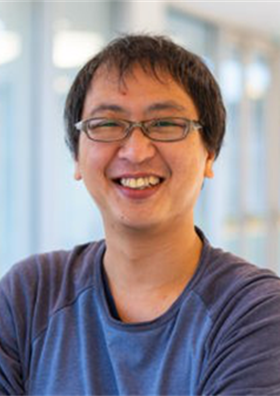
◆ Professor
◆ Principal Investigator
◆ Research Group Leader
◆ Doctoral supervisor
Unification of technological innovations (e.g., point-of-care technology, machine learning, smart material) to be useful for Personalized Medicine and Population Health.
Prior to joining SSLAB, he was a Research Scientist at SMART, Massachusetts Institute of Technology, and Research Group Leader at International Iberian Nanotechnology.
Research Theme
Personalized medicine has always been associated with genomic medicine due to the ´hype´ The Human Genome Project. Genetic contributions to different diseases, however, were found to be varied and often had very little impact, with non-genetic factors such as macro- (e.g., environmental risks) and microenvironment (e.g., microbiome) having much greater attributable risks. Thus, the key goals to understanding human health and disease depend on the ability to access the ‘genotype-phenotype correlogram´ through multi-omics platform and the success of translating technological innovations (e.g., machine learning, smart material) into the next generation of precision medicine.
Our research focuses on addressing the unprecedented challenges (and opportunities) by introducing a novel class of multidimensional time-domain NMR-based ´molecular signature´ of biological fluids with respect to its´ various pathological states. We demonstrated that highly unique and specific `molecular signature´ in single drop of blood can be rapidly typed (in minutes) using home-built NMR spectrometer. Liquid biopsies (e.g., blood) holds great promises in clinical medicine as it provides multiple global snapshot information non-invasively for disease management in uniquely personalized manner.

Figure 1 – Unification of technological innovations (e.g., point-of-care technology, machine learning, smart material) to be useful for Personalized Medicine and Population Health.
Top 5 representative articles
Featured in INL website
INL team developed QR-code for blood
In RTP 1 – Bom Dia Portugal | 29-09-2020
In RTP Online | 29-09-2020
Featured in Correio do Minho.pt
Featured in myDiabetes
Featured in Portuguese Publico.Pt
INL researchers discovered new insights into diabetes
Featured in Bom Dia Europa
Featured in INL website
Foreign Policy: A World Disrupted: For Using Magnets Beat Malaria.
Passport Health USA: New Device to Diagnose Malaria in Minutes.
The Guardian: Breakthrough in rapid diagnostics: using magnets to test for malaria.
The Strait Times: New test fast-tracks diagnosis for malaria.
Bangkok Post: New test fast-tracks diagnosis for malaria.
Award: Top 100 Leading Global Thinkers 2014 (Category "Healers") organized by Foreign Policy, Chevron Corporation
Technology.org: A New Way to Diagnose Malaria.
MIT News: A New Way to Diagnose Malaria.
HealthCanal: A New Way to Diagnose Malaria.
Machineslikeus: A New Way to Diagnose Malaria.
Global Scientific Awards and Media Highlights
2021 Invited to Editorial Board Members of Scientific Reports, Nature Research
2020 Featured in The Sun Daily and China Press
2020 Top 5% (all-time) online attention - research output ranked by Almetric
2018 China 1000 Youth Talent Plan
2015 Featured in Scientific Malaysian Magazine 2015
2014 100 Leading Global Thinkers 2014
Category: A World Disrupted - Category 'HEALERS'
Publisher: Chevron Corporation´s Foreign Policy magazine recognizes the world's pre-eminent thought leaders and public intellectuals in an annual issue, "100 Leading Global Thinkers". The editors of Foreign Policy select the 100 global thinkers based on their standout contributions over the previous year and their ability to translate ideas into action that change and shape the world. Honourees include a range of leaders, and innovators around the world, such as Jennifer Doudna (CRISPR), Mark Zuckerberg (Facebook), and Jack Ma (Alibaba.com).